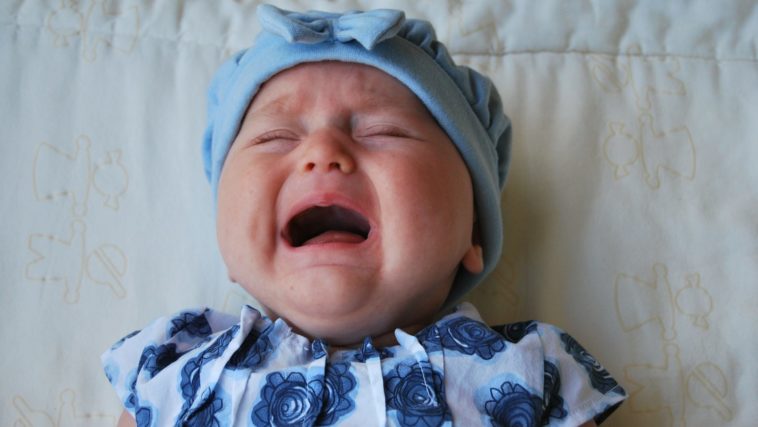I find one of the things new parents worry about most is their baby crying, and how they should cope with it. Anxiety about your baby crying is natural; however, babies need to cry as they can’t talk, and crying is an important part of their expression and development. A good cry doesn’t harm your baby, and in the early days of life, it can help to expand the lungs and is a sign of healthy development. In fact, if our babies didn’t cry we would worry.
Babies have hugely different personalities, and some cry more than others. If your baby has cried a lot in the first few weeks of life, by the time she reaches six weeks she will cry considerably less. It may seem to you that your baby cries a lot more than other people’s, but don’t worry, as all babies can be encouraged to cry less. My approach involves not picking her up each time she cries, which teaches her to settle herself. This can initially seem quite counter-intuitive, as we all have an inbuilt reaction to pick up a baby as soon as we hear it crying. As you get to know your baby, you will learn a huge amount about the reasons she cries and how to comfort her.
Reasons for Crying
There are a number of reasons why babies may cry:
- hunger
- tiredness
- pain or discomfort
- temperature (too hot or cold)
- needing attention/contact
If your baby is well and healthy and yet cries on and off during the day and night, he is probably crying because he is hungry. You will notice that he wakes frequently between feeds and may only settle for a little time after being fed, and at other times he may not settle at all. He may also suck his fists and be quite agitated. You may find that he sleeps well after one particular feed; however, this may be due to being overtired.
Normally, a baby who cries with hunger is not getting enough to eat, and this can be easily rectified. If you are breastfeeding, you can add more feeds during the day. You can also increase the length of each feed, making sure that your baby reaches the hindmilk, which fills her up. If you have done all of this and your baby still seems hungry, I would suggest that you top her up with 25 ml (an ounce or so) of formula suitable for her age at one or two feeds during the day. Try this for a couple of days, and it should satisfy her hunger. I usually do not recommend that you top up with formula at more than two feeds a day, as you may find that your milk supply lessens. For hungry bottle-fed babies, you can increase the feed by 25 ml (1fl oz) at each feed.
When your baby is full and satisfied, you will find that the constant crying stops. Your baby will be happy and contented, and will probably need to be woken for a feed rather than waking by himself. Time and time again, I have found that hunger is the primary cause of constant crying, and once this need is met both baby and parents are much happier.
Another sign of hunger is failing to gain weight, which your health visitor will alert you to. Babies should gain, on average, 170–230 g (6–8 oz) a week until the age of three months. If your baby is vomiting or has a reflux problem, he may be unable to keep enough of his feed down to gain weight, and will often be hungry and in pain. If this is the case, you need to see your doctor.
Crying due to Tiredness
Your young baby should be having around sixteen to eighteen hours of sleep per day. Some babies need more than others, and you are fortunate if yours needs more! Some will survive on much less, but it is important that you don’t let your baby get overtired. If she has been up for a while, and you know that she has had a good feed and been winded, it is very likely that she is crying because she wants to be tucked down to sleep. A tired cry will not normally sound as desperate as a hungry cry, and your baby will be showing all the physical signs of tiredness
Preventing overtiredness is crucial to help you avoid a situation where your baby becomes increasingly fretful and difficult. I have found that many new parents don’t put their baby down to sleep soon enough when he is crying, because they feel a need to stop him crying completely before tucking him down.
If your baby is overtired and crying, swaddle her, cuddle her close and then put her into her cot and tuck her securely in. You may find that she cries on and off for another ten minutes or so. If possible, try to leave her to settle herself. Normally during this time, she will have a good shout at the beginning, which will gradually decrease until she stops and goes to sleep.
Crying due to Pain or Discomfort
Minor illnesses such as colds, ear, and chest infections are quite unusual in young babies. However, in my experience babies with older siblings tend to be more susceptible to these illnesses in the early months of life. Ear infections will cause discomfort to your baby when sucking, and he will probably cry when feeding, and on and off during the day. Chest infections and colds will make it difficult for him to feed, and he will often cry because of this.
If your baby has an ear or chest infection he will usually have a raised temperature, and you will need to see your doctor. If your baby has gastroenteritis (vomiting and diarrhoea), this can cause crying due to pain and discomfort. You need to see a doctor as soon as possible, as your baby can dehydrate very quickly.
Babies will cry when they are teething. From around four months, your baby will show signs of teething including dribbling, red cheeks, sucking her fingers or fist, and crying more than usual. Teething can also cause a sore bottom and loose stools, which may make your baby uncomfortable. She may also wake up crying in the night because of pain in her gums. Infant paracetamol will soothe the pain and help her to sleep. You can also use teething granules, gel or teething rings. Teething pain comes and goes, and I’ve often found that cutting the tooth doesn’t seem to cause as much pain as
the development of the tooth in the gum. Another cause of crying is wind or colic. Some babies suffer more from wind than others, and it is important to make sure that your baby has brought up all his wind during and after a feed. Your baby may cry during a feed and pull away from the breast or bottle because he has wind. If he does this, don’t worry about stopping the feed and winding. Your baby may also bring his knees up, tense his body and cry in pain after a feed. If he shows these signs, he definitely needs winding. If you put your baby to sleep after a feed, and after about fifteen to twenty minutes he wakes up screaming, it could well be that he needs to be winded.
If your baby is uncomfortable, she may well cry to let you know. The best position for young babies to sleep in is to be flat, and if she has been in a car seat or chair for a while, her back may hurt and she will cry. Moving your baby and laying her flat will often help her to be comfortable and stop her crying. Your baby will also cry out suddenly if her head is not supported and flops back. Make sure when lifting and holding her that her head is securely supported.
Crying due to Changes in Temperature
Your baby will wake and cry in the night if he is too cold, even if he is not hungry. Make sure he has enough covers on and is tucked in well to prevent him kicking the covers off. Once your baby starts moving around in the night, it is easier for him to wake from the cold; a baby sleeping bag can help here. When out and about in the buggy or pram, make sure he has the right clothing and enough covers to keep him warm.
Your baby can also cry due to overheating. If this happens, her neck will be very hot and her face will be red. It is very important to cool her down by removing some of the covers, or clothes if it is very
warm. Check the temperature of the room (ideally 16 to 18 °C). In a pram or buggy, your baby can easily get too hot if you have the rain cover on and the sun comes out, or you go into a warm shop. Remember to take the cover off and let her have some air.
Crying for Attention or Contact
Newborn babies are much more likely to cry from physical need than specifically to get your attention. However, babies do love physical contact and cuddles, and if you have checked that his physical needs are met and he is still crying, perhaps he just needs some close contact with you.
As your baby gets older and is spending longer awake in the daytime, she may cry simply to get your attention, or even cry if you leave the room. This often happens from about three months onwards, as your baby does not yet fully understand that when you leave her, you have not disappeared and you will return. To deal with this, you can continue to chat to her and reassure her that you are coming back. Often, rushing to pick your baby up in this situation can actually increase her anxiety about being left. Talking reassuringly will help your baby to become used to settling herself and being happy in her own company. However, if she is obviously very distressed, pick her up and give her lots of cuddles to comfort her.
To help your baby get used to you coming and going, you can leave him in his chair or playpen and let him watch what you are doing. A few familiar toys around him will help him to feel secure, and provide a useful distraction.




